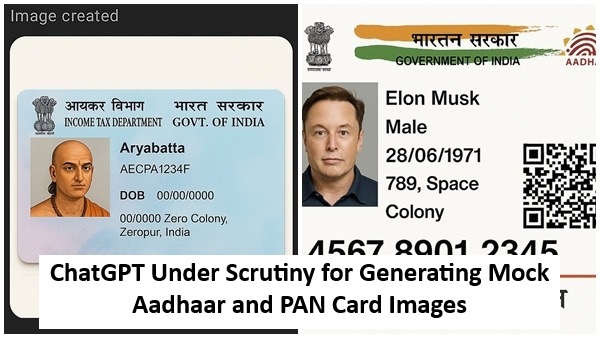
OpenAI's artificial intelligence chatbot ChatGPT is once again in the spotlight—this time for reportedly generating mock Indian identity documents, including Aadhaar and PAN cards, raising concerns over potential misuse.
Over the past week, screenshots have surfaced across social media platforms showing users asking ChatGPT to create replica ID cards using fabricated names, addresses, and ID numbers.
Can ChatGPT Actually Generate Fake Aadhaar and PAN Cards?
Technically, no. When tested the tool through different devices, the responses varied slightly:
On the Mac app, ChatGPT refused the request outright, citing legal restrictions.
On the iPhone app, ChatGPT maintained the same legal position but offered to create mock templates with fictional details for design or demonstration purposes.
Upon providing sample information (excluding real personal data), ChatGPT successfully generated graphic mock-ups resembling Aadhaar and PAN cards—with clearly fictional names and numbers.
What If You Enter Real Details?
While ChatGPT prompts users not to provide sensitive personal information, users reported that the tool still generated Aadhaar and PAN-style images if real details were input. However, this remains highly discouraged due to privacy and misuse risks. OpenAI’s system does not verify the authenticity or legality of input data.
Viral Posts on Social Media Raise Alarms
Numerous users posted screenshots of Aadhaar and PAN cards created by ChatGPT using well-known names like Elon Musk and Sam Altman. Others claimed to have used their own data to produce images resembling legitimate identity documents. These posts have triggered widespread debate over AI misuse and digital identity security.
OpenAI’s Stance and Content Policy
As of now, OpenAI has not officially commented on this specific issue. However, the company’s content policy strictly prohibits:
Generation of any official documents
Misuse of personal data
Creation of explicit or illegal material
OpenAI acknowledges that the latest models are capable of producing highly detailed visuals and layouts, which increases both utility and risk.
Ok, so ChatGPT can create Aadhaar images. Thats not the interesting thing. The interesting thing is where did it get the Aadhar photos data for training? pic.twitter.com/kb6lvuD04E
— nutanc (@nutanc) April 3, 2025
“Safety is an ongoing investment. As we learn more from real-world use, we will refine our policies accordingly,” OpenAI states on its website.
Read More: Acer Super ZX and Super ZX Pro Launched in India: Price, Features, and Specifications

 Share
Share



